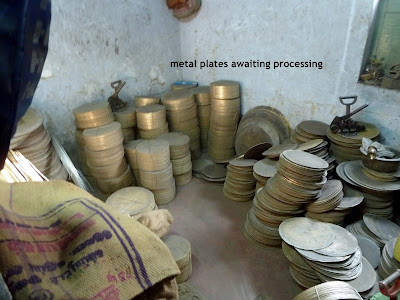Matiari, a village
where people are 24 hrs at work. It can be called a Brass working village. The
history of the village dates back 100 years back. The senior leaders of the
village went to Calcutta to work in the brass utensils making factories but as
they grew old and less efficient, they were sent back to their native place.
As
the villagers had nothing to do for their livelihood; they
started making the brass utensils at home. And that is how the tradition is
going on and today it has become main source of income for the people living in
Matiari.
We had tied up at the jetty late in the evening and the excursion to
see the metal workers was for early morning: 7.00 am!! This meant getting up
much earlier so as to be ready on time. Ghastly thought. Early morning, I could
hear from my cabin’s open windows the sound of metal being beaten. It’s a sound
one does not expect at that hour. ... the constant thump of a hammer on metal.
We had two guides who as it later turned out were artisans working in the village. One of them was gifted engraver.
Every household is involved in the business
of metal in some way or another. Each unit makes one
item: whether it’s rolling, pressing, design or polishing. There is no other
industry. Every house does some part of the process. So, we left at 7.00 am for
a sightseeing tour of the village. Early as our guide claimed that people work
here at night time when it’s cooler. The fires are hot and daytime becomes
unbearable. There was no particular order of our visits to the workshops.
We saw the thalis being made, then
saw the whole process -- basically, scrap being fed into furnace, Metal ingot weighs
500 gms. These are then put into furnace and repeatedly rolled and heated until
you get plates. Making plates, they get ₹15 / kg for a bundle which is between 30-35 kgs. These are then
sent to finishers who remove rough edges. Polishers then create the finished
article. We saw large biryani handis being made along with other utensils. Most
of them work in semi darkness. They are really poor in this town. Saw only two
houses of one storey with AC.

 We then went to two shops. The locals with us who were answering
our questions turned out to work at these shops. One of them was an engraver. I
bought a copper brass cup and then thought he could engrave my grand daughter’s
name on it. This he did.
We then went to two shops. The locals with us who were answering
our questions turned out to work at these shops. One of them was an engraver. I
bought a copper brass cup and then thought he could engrave my grand daughter’s
name on it. This he did.
The group were surprised with the engravers speed and
delicate hand. I even asked for a rose along the name. So I paid ₹300 for the cup and gave ₹100 each to the owner and engraver
for the engraving. Total ₹500.
At the next
shop I bought a small Ganesh for ₹300 as the group did not buy much here. We walked back and were
on board by 10.00 for our onward journey.
I went back to my cabin and tried to sleep having got up at 5.30
am. Luckily, I woke just as we passed the area of the Battle of Plassey. I came
to know about it afterwards at lunchtime!
Text and photographs copyright of the author. No part of this article or photographs maybe transmitted or reproduced by any means, electronic, mechanical, photocopying or otherwise, without written permission. Do contact the author on email -- helpthesun@gmail.com




















No comments:
Post a Comment
Text and photographs are copyright of the author. No part of any article or photographs maybe transmitted or reproduced by any means, electronic, mechanical, photocopying or otherwise, without written permission. Do contact the author on email -- helpthesun@gmail.com